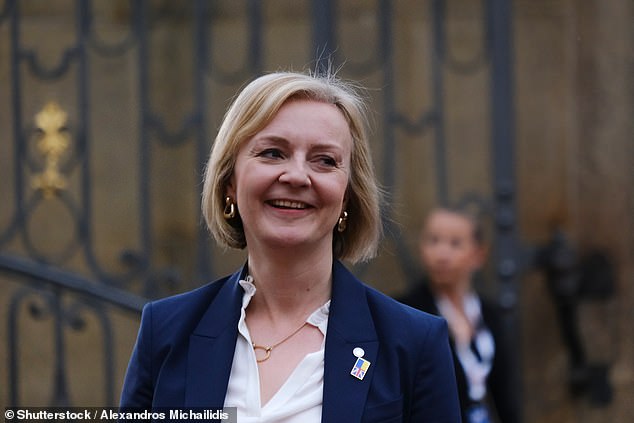Fixed-rate mortgages have fallen to levels not seen since Liz Truss was Prime Minister.
The lowest five-year fixed mortgage rate is now 3.77 per cent, after NatWest cut its rates yesterday.
This is the lowest five-year fixed rate since before the September 2022 mini-budget, according to Rightmove analysis.
Although mortgage rates started to rise towards the end of 2021, interest rates accelerated after the mini-budget at the end of September 2022.
NatWest has launched a mortgage with a rate of 3.77%, which is the lowest five-year fixed rate since before the September 2022 mini-Budget when Liz Truss was Prime Minister.
The pound plummeted after then-Finance Minister Kwasi Kwarteng announced a wave of unfunded tax cuts that destabilised bond markets.
After Liz Truss resigned in October, new Chancellor of the Exchequer Jeremy Hunt reversed almost all of the mini-budget announcements, calming markets.
Natwest’s 3.77 per cent five-year fixed deal, which comes with a £1,495 fee, is available to those buying a home with a deposit of at least 40 per cent.
Someone with a £200,000 mortgage due over 25 years could expect to pay £1,030 a month under the NatWest deal.
House-movers and first-time buyers with a smaller deposit can now also get rates not seen since the 44 days the Prime Minister was in power two years ago.
Those who buy with a 25 per cent deposit can get 3.93 per cent with NatWest or 3.95 per cent with Barclays if they fix the loan over five years.
Halifax, Nationwide, Virgin Money and HSBC are also offering five-year fixed rates below 4 per cent for buyers of 25 per cent deposits.
Anyone buying with a 15 per cent deposit can get a rate of 4.17 per cent with Barclays, while buyers with a 10 per cent deposit can get 4.59 per cent with Nationwide or Virgin Money.
Rightmove says the average five-year fix is now 1 percentage point lower than a year ago and the average person with a 40 per cent deposit can now get less than 4 per cent.
Paying a 4 percent rate instead of a 5 percent rate on a mortgage can make a big difference in a family’s budget.
On a £200,000 mortgage repaid over 25 years, that’s the difference between paying £1,056 a month and £1,169.
On a £400,000 mortgage payable over 25 years, the difference is between paying £2,111 per month and £2,338 per month.
Chris Sykes, technical director at mortgage brokers Private Finance, does not think rates are likely to improve much in the near term.
He points to the fact that Sonia’s swap rates, which influence the prices of fixed mortgage rates, have risen over the past week.
Market interest rate expectations are reflected in swap rates. A swap is, in essence, an agreement in which two banks agree to exchange a stream of future fixed interest payments for another stream of variable payments, based on a set price.
These swap rates are influenced by long-term market projections for the Bank of England base rate, as well as the broader economy, internal bank targets and competitors’ pricing.
Together, swap rates create a kind of benchmark that can be seen as a measure of where the market thinks interest rates will go.
As of September 2, five-year swaps stood at 3.71% and two-year swaps at 4.06%. This is slightly higher than on August 2, when five-year swaps stood at 3.51% and two-year swaps at 3.96%.
“Some lenders’ fixed rate spreads compared to Sonia swaps have become noticeably thin as these swaps have risen this week and rate cuts have continued with HSBC, TSB, Natwest and others cutting rates in recent days,” Sykes said.
‘Depending on the rate at which lenders have applied their hedges, some of the most competitive rates could soon become unsustainable.
‘These attractive rates could be a strategic move by lenders to capture the traditional post-summer demand, as potential buyers consider moving home when children return to school and summer vacation ends.
‘For those planning to purchase or refinance in the fall market, it may be prudent to lock in a rate as soon as possible, as the possibility of rate increases re-entering the market cannot be ruled out.’
Some links in this article may be affiliate links. If you click on them we may earn a small commission. This helps us fund This Is Money and keep it free to use. We do not write articles to promote products. We do not allow any commercial relationships to affect our editorial independence.


